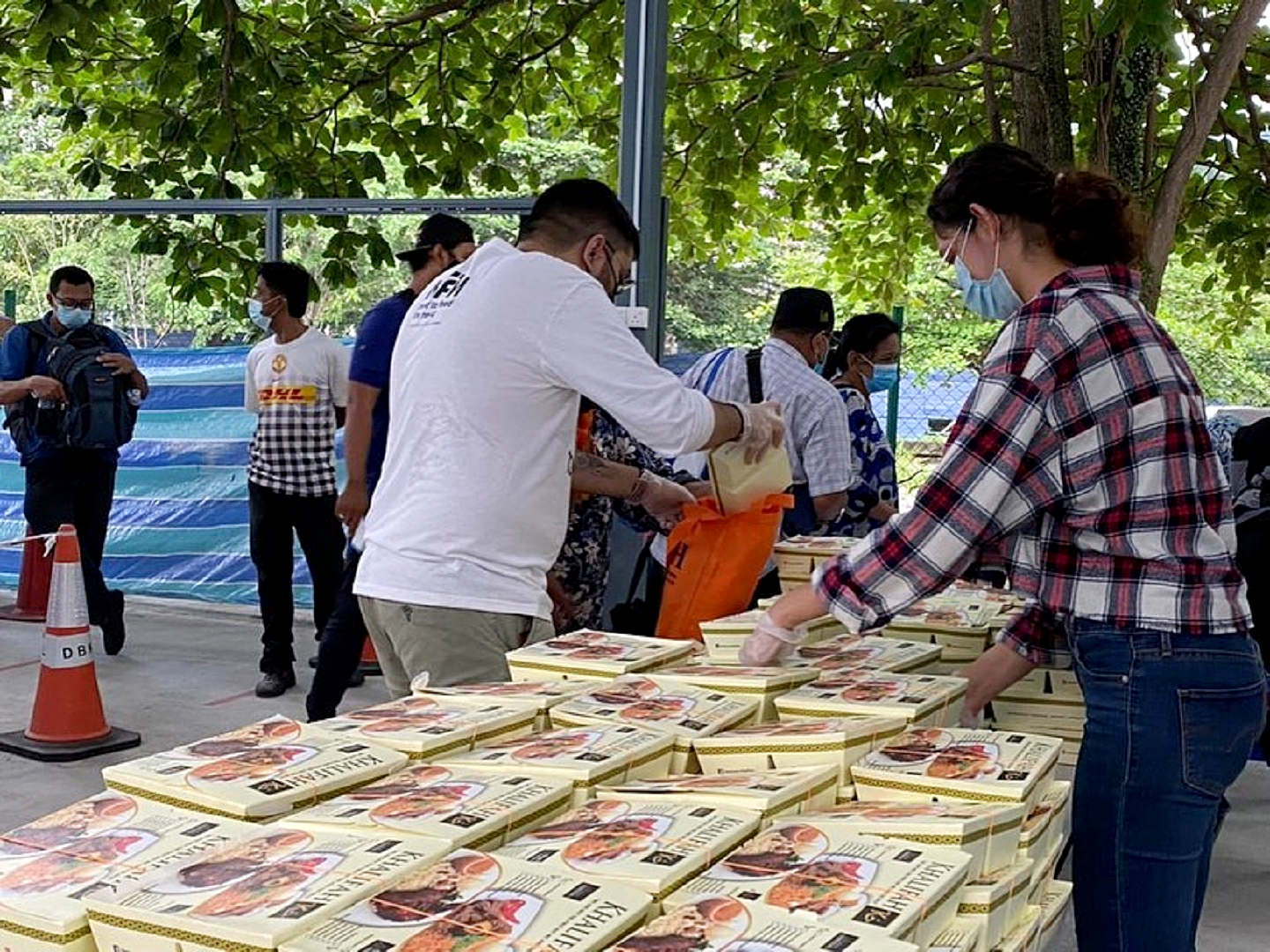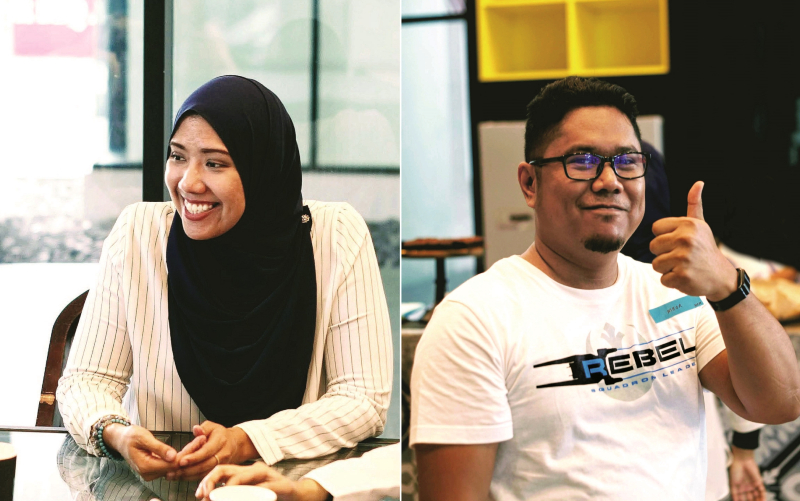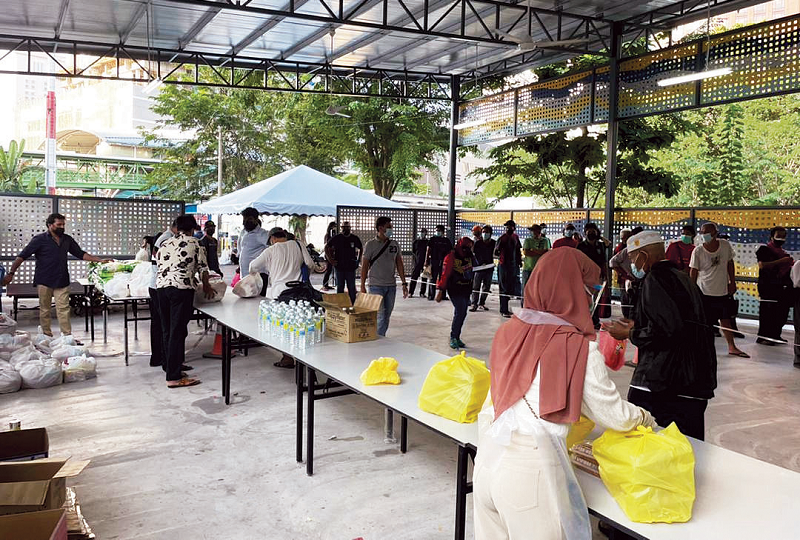
Food distribution continued during the MCO in an expanded compound and stricter SOPs (All photos: Need to Feed the Need)
As a non-governmental organisation and soup kitchen, Need to Feed the Need (NFN) is quite well-known. It was formed in 2013 by a group of six friends who decided to distribute free food in the Chow Kit area in Kuala Lumpur on Thursday nights to those who needed it. In 2015, it began distributing food every Thursday at the Medan Tuanku Distribution Centre — which houses all the NGOs and soup kitchens that distribute food every day.
In 2017, NFN registered as an NGO, and not only does it feed marginalised communities in Kuala Lumpur, but also provides other essential support such as welfare registration, rehousing, besides giving free haircuts and beard trims.
Options had the opportunity to speak to two active members of NFN’s operations team — Adora Yusof, who is the head of field operations, and Meor Hizmin, the media and communications coordinator. Adora, who was a lawyer for a decade, shifted gears last year and is now a project manager in an automotive company. Meor is a writer for a local animation company, Animonsta Studios.
Both Adora and Meor joined NFN in 2017 as regular volunteers. “We volunteered weekly, participating in their group calls via Instagram. We saw how the crew managed the whole distribution, and over time became regulars. As volunteers, we had shown commitment and knowledge of the whole process and were made part of the permanent crew of NFN,” says Adora.
adora_and_meor_of_nfn_1.jpg

Determined to take its service to the next level, NFN introduced Next (NFN Extension). “It is where we take things a step further, not just by giving food every Thursday night, but also by getting more involved in the lives of our patrons,” says Adora.
“Basically, we visit them in their homes, get information about their needs and try to provide for them. There’s only so much food you can give at the distribution centre, and sometimes they need more than food. Being a small operation, we cannot really afford to help everyone. But we try to identify those most in need,” adds Meor. They recall helping a family of nine who lived together in one room. Their limited space made it hard for the children to play and study.
Next was also a way to connect potential donors to the families who needed help directly. “We interviewed many of the families to get their stories, and we published them on Instagram. This helped connect the patrons to our followers and also showed our followers who it was we were helping, and how,” says Meor. Other than food, NFN also does its best to provide toiletry kits, women’s sanitary products and other essential items such as milk powder and diapers.
The lockdowns due to Covid-19 made it really difficult for NFN to operate. “We are very much a physical operation, whereby we go down to the streets and give out food,” says Adora. “We have an organised system, a registered system, and a list of recipients. That’s how we communicate and engage with our followers as well as potential donors. So from the first MCO (Movement Control Order), we had to change our SOPs (standard operating procedures), our modus operandi, and instead of doing physical distributions, we started suspended meals.”
distribution_during_mco_-_expanded_compound_and_stricter_sop.png

Suspended meals allow for NFN’s patrons to collect their meals with as little contact as possible. Working with its list of local vendors, caterers and mamak stalls, NFN was still able to have food ready to go. When the Kuala Lumpur City Hall (DBKL) opened temporary shelters for the homeless and urban poor community, NFN shifted its focus to providing meals for these shelters. “We were providing meals to six shelters in one day, and we’re not just talking about main meals; we had included breakfast, lunch, tea, supper and dinner. And each centre would serve 80 to 300 people,” explains Adora.
By June last year, however, NFN had to stop supplying to the shelters as it was running out of funds. Thankfully, other soup kitchens with more funding were able to step in and help.
“The first MCO drained our resources, so we had to step up our call for donations, on Instagram especially. We successfully stabilised and early this year, we started distributing at the Medan Tuanku Distribution Centre again. We even have permission letters from DBKL to go but with a limited crew,” says Meor. This is still challenging, as they feed more than 300 people every Thursday with a skeleton crew of four or five. Fortunately, the centre has been renovated to accommodate physical distancing and it is now a bigger, better ventilated space.
NFN welcomes monetary donations as well as food sponsorships. Corporate businesses have donated items such as toothpaste and toothbrush kits, toiletry kits, and more. NFN is run entirely by volunteers and depends completely on public donations. Before Covid-19, it had a kids’ corner, a space for children to play — a luxury they often do not have at home. For many, coming to the soup kitchen was also a safe time to socialise and be part of the community.
Adora and Meor hope that once people are vaccinated and herd immunity has been achieved, they can return to some version of normal and advance the Next programme. “I hope things look up pretty soon so we can safely mobilise an actual physical team. We really miss going out on the streets and seeing our patrons. Over the years, you get to know them, and they know us. NFN is not just a group of people giving out food; we have a connection with the people,” says Adora.
For more information or to donate, see here.
This article first appeared on Aug 9, 2021 in The Edge Malaysia.


